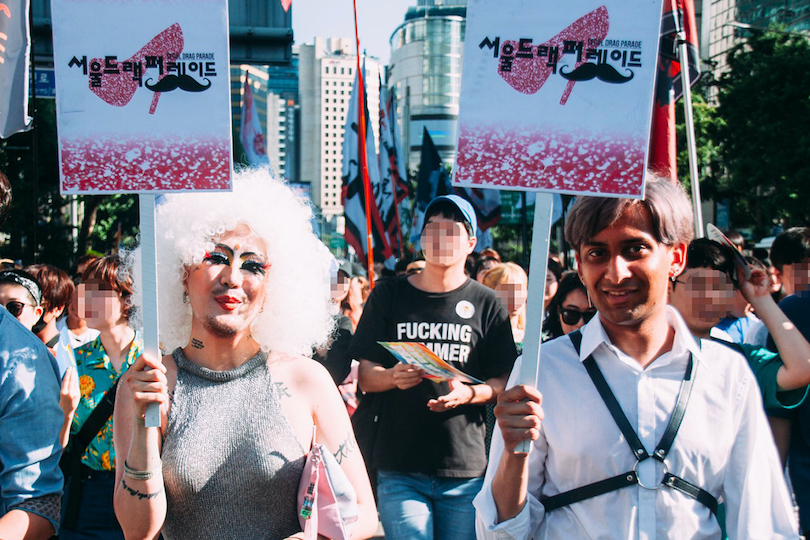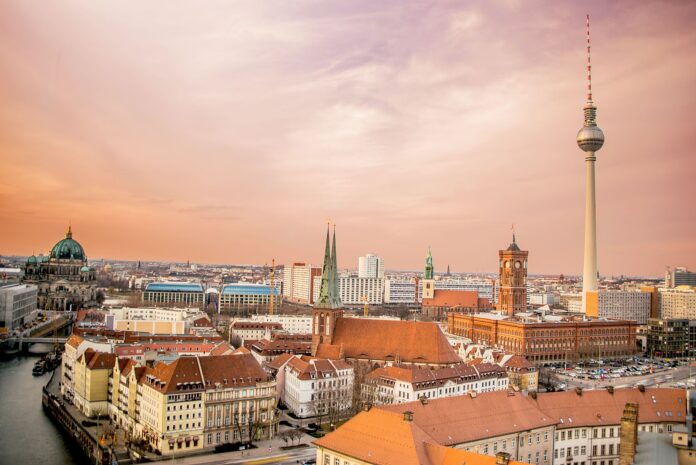Hurricane Kimchi is Co-founder and Chief Organiser of Seoul Drag Parade, often known as Heezy Yang. She is a Seoul-born Korean queer artist and activist and is actively collaborating in Seoul satisfaction (formally referred to as the Seoul Queer Tradition Competition), since 2011. She has additionally carried out at Korea’s regional satisfaction parades in Daegu, Jeju, Kyungnam, and Incheon. She has expertise internet hosting reveals and performing abroad, in New York, London, Oslo, and Copenhagen. In 2018, she featured on the Forbes 30 Underneath 30 Asia listing as an artist.
Ali Zahoor is Co-founder and Supervisor of the Seoul Drag Parade. He’s a freelancer, specialising in advertising, translation, and occasions organisation. He has spent a few years in South Korea and attended Korea and Yonsei Universities, the place he accomplished a postgraduate diploma that centered on queer migration. He has proficiency in English, Korean, Chinese language, and German, and has efficiency expertise whereas working within the Okay-pop trade for a number of years and appearing in British dramas, together with EastEnders. He has been a long-time activist, actively collaborating in Queer Tradition Festivals and different human rights actions throughout the UK and South Korea.
At current, each Ali and Hurricane Kimchi are engaged on the Seoul Drag Parade 2021, an annual LGBTQ occasion they manage and host.
The place do you see essentially the most thrilling debates in South Korean LGBTQ+ politics?
Hurricane Kimchi and Ali: Lately, LGBTQ+ points have been delivered to the fore in South Korean politics because of the prominence of the Seoul Queer Tradition Competition held at Seoul Plaza yearly and transgender points with necessary army service. The 2017 Presidential Election and the 2021 Seoul Mayoral Election had been significantly notable as a result of LGBTQ+ points had been introduced up through the dwell tv debates. In 2017 President Moon Jae-in, regardless of being a human rights lawyer and a extra liberal candidate, stated “I don’t like [homosexuality]”. Hong Joon-yo, a candidate from the conservative Liberty Korea Social gathering, claimed homosexuality within the army would undermine South Korea’s potential to battle North Korea. Slightly than thrilling, these debates had been miserable for the LGBTQ+ neighborhood, activists and allies. Nevertheless, LGBTQ+ folks and activists had been grateful that at the least the difficulty was being introduced up. Up to now, many figureheads in Korean politics denied the existence of homosexuality in Korea outright. However candidates from smaller political events in Korea, just like the Justice Social gathering, Inexperienced Social gathering and Mirae Social gathering, have voiced assist for the queer neighborhood.
How has the way in which you perceive the world modified over time, and what (or who) prompted essentially the most vital shifts in your pondering?
Ali: Rising up, I at all times needed to make some change. I believed the way in which to take action was by artwork or science, creating or inventing one thing that would assist folks. Activism by no means crossed my thoughts till I met Hurricane Kimchi and different nice activists once I moved again to Korea in 2017. I used to be motivated by them because of the discrimination I confronted as the one overtly queer individual in my graduate college and the individual with the darkest pores and skin color. When it got here to discrimination prior to now, significantly dwelling within the UK, I at all times had some religion in establishments and another person stepping in to take care of the state of affairs, however when confronted with institutional discrimination, I started to consider within the energy of the person and the marginalised. I might see earlier than my eyes that by being current, talking at occasions, organising, and performing, I used to be capable of make a distinction and I consider I could make a distinction. Though I received’t communicate for different folks, I consider that I’ve an obligation to make the world a extra accommodating place for extra folks, which I do by Seoul Drag Parade by offering a protected house for queer folks to get pleasure from themselves. As most queer occasions are restricted to bars and golf equipment, we manage the drag reveals for the minors to attend. Heezy and I attempt our greatest to lift consciousness of queer points in South Korea by platforms like social media, talks and interviews, like this. So even after returning to the UK, I continued my activism regardless of beforehand pondering “issues aren’t that dangerous, so activism isn’t one thing that considerations me”.
May you inform us in regards to the origins of Drag artwork in South Korea? How has it developed over time?
Hurricane Kimchi and Ali: Like many cultures, Korea additionally has historic examples of cross-dressing in theatre and artwork lengthy earlier than the thought of drag was labelled or queered as it’s at the moment. Talchum is a masked efficiency predating the Joseon dynasty (1392-1897) that featured male actors taking over normally comedic feminine roles. This form of roleplay has continued. There isn’t a scarcity of males dressed as ladies showing in Korean media, whether or not Okay-pop idols queerbaiting or comedians mocking ladies. It’s as much as a person whether or not they see this misogynistic efficiency as drag or not, because the efficiency isn’t by queer folks. Drag, as it’s extra generally identified at the moment, started within the underground queer scene in Itaewon a number of many years in the past, the stays of that are seen at bars corresponding to Trance, the place older queens carry out extra camp, comedic, cabaret-like routines. Over time, significantly prior to now 5 years or so, with the recognition of drag growing and RuPaul’s Drag Race coming to Netflix Korea, there’s a appreciable shift in prioritizing visuals over efficiency whereby cisgender male drag queens attempt to mirror lovely cisgender females as intently as doable. Any such drag is commonly carried out in areas that discriminate towards AFAB (assigned feminine at start) and transgender folks when it comes to entry payment, so drag is ceaselessly attacked by feminist teams in Korea. Many homosexual bars in Seoul the place drag is carried out don’t permit ladies or they’re charged with excessive entrance payment (normally 10,000 received for males and 50,000 received for ladies). The homosexual bars usually determine this by the gender on somebody’s ID which is inconceivable for trans folks to alter except they’ve sure surgical procedures.
Concurrently, extra gender expressive drag has additionally come about, usually carried out in areas catering to extra English audio system and foreigners. This consists of gender non-conforming non-binary performers and drag kings, with a distinguished neighborhood of the latter holding an annual Drag King Contest. Worldwide affect on the drag neighborhood is plain with the recognition of RuPaul’s Drag Race, which could possibly be a proof for essentially the most well-known drag artists amongst Koreans being the aforementioned hyper-feminine drag queens. We began Seoul Drag Parade in 2018 as a response to the expansion in reputation of the artwork type and our first occasion noticed round 1,000 attendees, making it Asia’s largest drag parade. We purpose to honour all types of drag. I’d say now there are nicely over 100 drag artists in Korea, lots of whom don’t carry out dwell.
Are you able to give us a short snapshot of Drag in Seoul in the intervening time? Particularly through the pandemic?
Hurricane Kimchi and Ali: It’s all on maintain in the intervening time as venues are nonetheless very restricted. Queer venues in Itaewon obtained hit significantly laborious after a witch-hunt that blamed them for a small outbreak in COVID-19 circumstances. This attracted large media consideration regardless of being a lot smaller than any of the outbreaks in church buildings. It’s a darkish time as many drag performers have continued to publish on social media, however with no revenue from dwell reveals. Seoul Drag Parade collaborated with the scholar union at SOAS (College of Oriental and African Research, College of London) to place collectively a web-based present, that includes a number of drag artists from Korea. At present, we’re fundraising to organise a bilingual on-line present with a extra numerous solid for Seoul Drag Parade 2021 which we hope to conduct in June. I count on issues to return to relative normality after the restrictions ease. Some performers, together with Hurricane Kimchi and Hoso Terra Toma have participated in a number of on-line reveals organised overseas.
What do you take into account the position of Drag to be in relation to gender efficiency?
Hurricane Kimchi: Drag basically is gender efficiency. I consider that’s what differentiates it from theatrical cross-dressing, for instance. Via make-up, outfits, and expression, drag artists are performing gender. We’ve come throughout a great deal of younger queer individuals who don’t do drag as a result of they need to carry out in bars however quite, they can specific their gender identification by drag and dressing in a method they wouldn’t be capable of normally due to work, college or society. Lots of people don’t do drag as a result of they need to lip-sync or become profitable, it’s extra for the sake of gender expression – a private factor.
What are some similarities or variations between South Korean and Western Drag cultures?
Hurricane Kimchi and Ali: It’s laborious to check as a result of there’s a large distinction even between British and American drag. Therefore, defining Western drag tradition is a battle by itself. I suppose with drag in Seoul solely simply popping out of its nascent part, it’s laborious to check the tradition with someplace like London the place there are established venues, performers, and reveals. However even in comparison with different Asian international locations like Hong Kong, Bangkok, or Kuala Lumpur, Seoul drag tradition differs rather a lot. From the drag I’ve seen in these cities, there appears to be extra native cultural affect. Drag performances in Seoul borrow rather a lot from American tradition, whether or not they carry out in English or Korean, like Okay-pop which additionally borrows rather a lot from American tradition. Wherever you go on this planet, you’ll most likely find yourself seeing a younger drag queen lip-syncing to the newest Ariana Grande launch. Different drag artists get pleasure from cultural or historic references and make them queer by drag.
I feel for some queer individuals who have been discriminated towards by Korean society, drag is a form of escapist method to distance themselves from the Korean patriarchy by leaning into overseas drag cultures. Since there isn’t a anti-discrimination regulation, popping out might imply lack of job, getting kicked out by a landlord, and so on. There are circumstances of this taking place when folks grow to be outcasts. An actor referred to as Hong Seokcheon got here out in 2000 and obtained exiled by the trade for nearly eight years, so persons are terrified of being outed or popping out. As a result of patriarchy and Confucianism, what is anticipated of women and men could be very totally different, how they need to gown, act, behave and so on., so drag generally is a type of revolt towards this. Homosexuality can be unlawful for troopers regardless of necessary service for all males. Even when persons are not fired or eliminated for being homosexual, discrimination would most probably happen as there may be typically destructive sentiment in the direction of queer folks – as evidenced at many regional satisfaction parades, the place protestors outnumber attendees’.
There may be additionally large stigmatism of homosexual males regarding AIDs and the inadequate consciousness round AIDs and what it’s. Many massive media homes and Christian teams run fear-mongering campaigns towards homosexual folks claiming that, for instance, the legalization of same-sex marriage or an anti-discrimination regulation will trigger a well being disaster because of growing charges of HIV and that many individuals will grow to be homosexual or transgender, resulting in a good decrease start fee. Thus, it’s difficult to be queer, and even an ally, in this sort of society.
What position does South Korean LGBTQ+ activism play in worldwide LGBTQ+ politics?
Hurricane Kimchi and Ali: Naturally, LGBTQ+ activists around the globe encourage one another and have an effect on worldwide LGBTQ+ politics. For instance, the legalisation of same-sex marriage in Taiwan gave many queer activists in South Korea hope and since each international locations are socioeconomically comparable, this ruling supplied another excuse to justify these calls for in South Korea. Sadly, with no anti-discrimination regulation in place, South Korea doesn’t have enough rights for LGBTQ+ folks. So, quite than Korean queer activism taking part in a task in worldwide queer politics, it’s extra the opposite method round. The LGBTQ+ rights motion around the globe, significantly within the USA and South Korea’s neighbours, influences inside queer politics right here. South Korea ought to meet up with the remainder of the world when it comes to recognising queer relationships and introducing an anti-discrimination regulation.
How did you get into Drag?
Hurricane Kimchi: I began to get energetic in Seoul’s LGBTQ+ scene as an artist within the early 2010s. I did a variety of issues; illustrating, photographing, exhibiting, performing (however not in drag), and so on. Then I met some individuals who do drag, corresponding to Kuciia Diamant and Vita Mikju, and have become mates with them. I most likely had my first in-person expertise of drag by them. I used to be fascinated by their apparel and passionate efficiency and, in 2014, determined to provide it a attempt. Initially, I solely used to decorate up and placed on make-up however didn’t carry out on stage. I assumed it was going to be a one-time factor. Nevertheless, I realised that by drag, I used to be capable of specific what I couldn’t in any other case, but in addition, I expertise totally different sensations and, nicely – experiences. Whereas I’m an introvert, for essentially the most half, I do have my extroverted facet and I have to be an exhibitionist once in a while, to inform my tales and specific what I’m normally protecting to myself. Drag was simply good for that. I began extra as an activist queen who would be part of rallies or protests, however then I obtained into creating expertise and qualities as a stage performing queen. Not like in Western international locations such because the US or the UK, dwell singing isn’t a factor right here – in Seoul (and in Korea), however I’m a singer-songwriter. I’ve been releasing singles and music movies whereas additionally performing my authentic songs together with covers on stage. I nonetheless attempt my greatest to get entangled in activism as a lot as doable and use my drag to advocate for and add energy to it.
Ali: I carry out however I don’t name it drag. I obtained extra into drag and supporting the artwork type after assembly Heezy and seeing how highly effective it’s as a device for activism.
How is your artwork and political activism linked? What’s the position of Drag in creating queer political areas in South Korea?
Hurricane Kimchi and Ali: Drag naturally positive aspects consideration as an artwork type blurring the strains of gender. Whereas cross-dressing isn’t an unusual sight for South Koreans, the queering of it’s. That helps within the battle for visibility. Many individuals say drag artists are the pioneers or the frontline of the queer neighborhood. When we’ve occasions like Seoul Drag Parade that takes place within the daytime for the general public to see, drag artists acquire consideration and have been an necessary a part of eliminating the outdated saying “there aren’t any gays in Korea”.
Whether or not you prefer it or not, drag itself could be very political, as a result of it includes performing gender and redefining gender norms (and plenty of different issues). Even with out the intention of getting political, by doing drag you make statements and specific your self, your ideas, and opinions for others to see, and that impacts folks – first folks round you, and finally folks in politics. What I like about drag is that there’s extra to it than combating and getting political. There’s artwork and leisure in it, and the facility of artwork and leisure is mighty. For the reason that latter has extra political energy and affect that’s usually unique to mainstream politics, unquestionably it results in creating areas for drag, artwork, dialogue, and finally political stuff, too.
What’s a very powerful piece of recommendation that you’d give to younger folks/LGBTQ+ activists?
Hurricane Kimchi: I feel it’s essential to do your analysis and be clued up on historical past, the regulation, politics, and theories. Take your time and work out what change you need and the way you need to go about it. From there, you will discover like-minded folks by teams and organisations. Strive to not step on any toes, particularly when you aren’t a part of the group of individuals whose rights you’re combating for, as a substitute supply your assist, and perceive what your position could be. After all, be enthusiastic and keen about your activism. Artwork and literature are nice mediums to get your message throughout.
Additional Studying on E-Worldwide Relations



.jpg)



